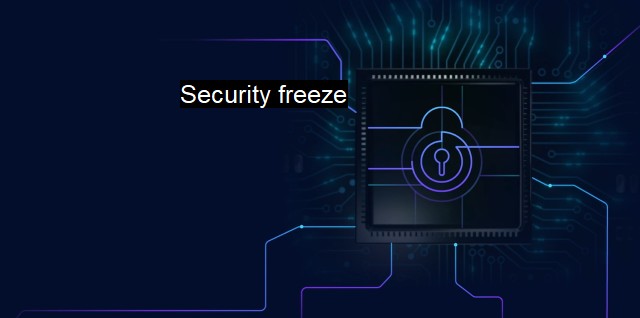What is Security freeze?
Understanding Security Freeze: A Must-Have Cybersecurity Measure to Protect Your Personal Information from Cyber Threats
In today’s digital world, cybersecurity has become an indispensable aspect of our daily lives. Our personal and sensitive information is stored either on our electronic devices or in the cloud, which makes them vulnerable to cyberattacks. Cybercriminals often steal information such as social security numbers, bank account details, or credit card numbers, and can use them for fraudulent activities.To protect yourself from these threats, it is essential to have the right cybersecurity measures in place. Besides antivirus software and firewalls, one effective way to safeguard your personal and confidential information is through a security freeze. Let us explore what a security freeze is and how it works in cybersecurity.
A security freeze is a protective measure that freezes your credit reports, making it impossible for cybercriminals to access your information. It is also known as a credit freeze or a credit lock. Lenders, creditors, insurers, or any other organization that requires accessing your credit report will not be able to do so with a security freeze in place. This makes it challenging for fraudsters to open new accounts in your name.
To set up a security freeze, you can contact each of the three credit bureaus – Experian, TransUnion, and Equifax. They will place a freeze on your credit report, which restricts access to it. No one, including identity thieves or lenders, will be able to access your credit information unless you unfreeze your report. You can easily lift the freeze temporarily or permanently when you want to allow parties to have access to your credit report.
The Benefits of a Security Freeze in Cybersecurity:
1. Protection against identity theft: A security freeze is a significant preventative measure against identity theft. Cyber-criminals often use your personal information to impersonate you, steal your money and take out loans or other credit in your name. With a security freeze in place, they cannot access your credit report, which eases the risk of identity theft.
2. Popular & Effective: There are many different security measures that one can use to protect themselves from online threats, including antivirus software and firewalls. a security freeze is quickly becoming one of the most effective and popular cybersecurity techniques used today.
3. Hassle-free process: Placing a security freeze is an easy process that only takes a few minutes of your time. All you have to do is contact the three major credit bureaus and request them to place a freeze on your credit report. At any point, you may lift or remove the freeze when needed.
Tips on using Security Freeze Effectively:
Bearing in mind that a security freeze takes your credit report private and locked, here are some pointers on how to use it best:
· Monitor credit activity: Although a security freeze can prevent cybercriminals from opening fraudulent credit accounts on your behalf, it does not prevent them from using your existing credit accounts. Regularly checking your credit reports from credit bureaus and monitoring your bank and credit card statements will help you identify and prevent cyber-criminals from accessing your personal accounts.
· Limiting credit applications: When setting up the security freeze, consider only unfreezing your credit reports when necessary. This will help to prevent your credit score from fluctuating frequently, which might cast doubts on your previous creditworthiness, limiting you from getting loans you need in your future.
a security freeze is a very useful aspect in cybersecurity, and employing it in protecting your personal and confidential details could go a long way in reducing identity theft risks. To set it up, contact any of the three credit bureaus, and decisively shelter risk bearing consequences.

Security freeze FAQs
What is a security freeze and how does it work?
A security freeze is a tool that allows you to restrict access to your credit report. When you freeze your credit report, it makes it more difficult for someone to open new accounts in your name without your permission. To place a freeze, you'll need to contact each of the three credit reporting agencies: Equifax, Experian, and TransUnion.Who should consider using a security freeze?
Anyone who is concerned about the possibility of identity theft should consider using a security freeze. It's especially important if you've already been a victim of identity theft or if you're someone who doesn't use credit very often.How much does it cost to place a security freeze on your credit report?
The cost of placing a security freeze on your credit report varies by state. In some states, it's free to place a freeze, while in others, there may be a small fee. You can check with each of the three credit reporting agencies to see what the cost is in your state.How do I remove a security freeze from my credit report?
To remove a security freeze from your credit report, you'll need to contact each of the three credit reporting agencies: Equifax, Experian, and TransUnion. You'll need to provide them with some personal information to verify your identity, and then they'll lift the freeze. Depending on your state, there may be a fee to remove the freeze. External Resources
| | A | | | B | | | C | | | D | | | E | | | F | | | G | | | H | | | I | | | J | | | K | | | L | | | M | |
| | N | | | O | | | P | | | Q | | | R | | | S | | | T | | | U | | | V | | | W | | | X | | | Y | | | Z | |
| | 1 | | | 2 | | | 3 | | | 4 | | | 7 | | | 8 | | |||||||